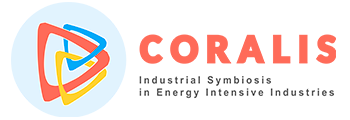Publishable summary: CORALIS is an EU-funded demonstration project designed to generate real-world experiences in the deployment of Industrial Symbiosis (IS) solutions (No. 958337). The deliverable D11.8 “CORALIS Learning Materials” documents the creation of learning materials aimed at promoting IS and their dissemination through knowledge transfer actions to two different stakeholder groups:
• stakeholders from the CORALIS contexts and their neighboring regions
• as wide as possible audience e.g. regional stakeholders across Europe.
This report outlines the methodologies employed, the activities conducted, and the results achieved, and reflects on future work. The main objective of the task was to facilitate knowledge transfer and capacity building among stakeholders thereby stimulating IS implementation.
The method started by identifying training needs through surveys and literature reviews, followed by content development based on these needs. Then the knowledge transfer actions took place, which included webinars, workshops, and training sessions and presentations.
In terms of knowledge transfer actions targeting a broad audience, five thematic webinars were conducted, covering the following topics: stakeholder mobilization, public-private partnerships, digital knowledge platforms, policy drivers and barriers, and financing IS developments. These webinars were recorded and made available on the CORALIS website for asynchronous learning. Moreover, key insights from the webinars were summarized in a short “executive summary” format and are also available on the CORALIS website. Participants found these sessions highly valuable, as the experts provided practical insights and discussed them among themselves, thus highlighting different perspectives. To support more hands-on participant interaction, an online workshop on CORALIS Business Models was organized, where participants engaged in working on various IS cases and developing their business models. The framework used for this workshop is detailed in the publication by Mirata, Lindfors, and Kambanou (2024).
Regarding knowledge transfer actions targeting the CORALIS ecosystems and their neighboring regions, training sessions were conducted in the three CORALIS contexts: Brescia, Escombreras, and Frövi. These sessions had similarities but were also tailored to specific regional needs and aimed to foster collaboration among local stakeholders. The training of people within the same ecosystem was found to be particularly beneficial for identifying future IS opportunities and creating a basis for collaboration. Additionally, CORALIS learning materials were integrated into university courses at Linköping University and an open online course for practitioners, extending the reach of IS knowledge to students and professionals.
In order to disseminate learnings related to low-grade waste heat utilization and Carbon Capture and Storage, CORALIS partners WA3RM took part in several workshops and made presentations in relevant events.
Looking ahead, the CORALIS project has identified several future needs and considerations to ensure continued knowledge development as a basis for the expansion of IS initiatives Key considerations include attracting participants from more diverse sectors and extending training sessions to allow broader coverage and support in the application of knowledge. Integrating CORALIS learnings into formal education curricula at more universities and educational programs is also essential, either by incorporating IS-related aspects into existing programs or developing stand-alone courses. The CORALIS team is willing to assist institutions interested in these recommendations. Additionally, the project has laid the groundwork for continued interactions and collaborations on IS training with EU initiatives such as RISERS, THESEUS, and the Hubs for Circularity Community of Practice, which aim to scale up IS practices in Europe.
To read the full document, click here.


